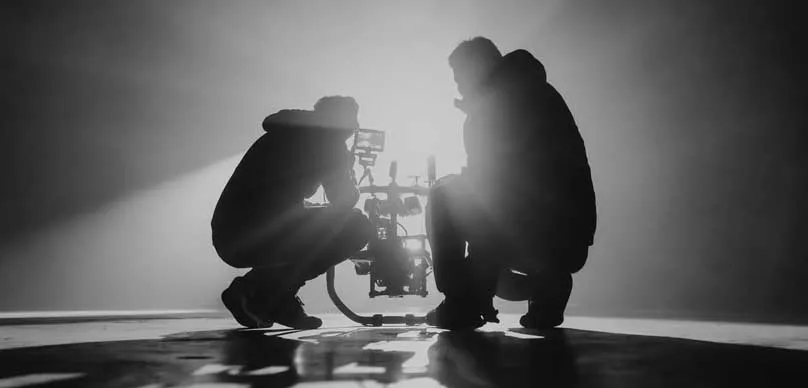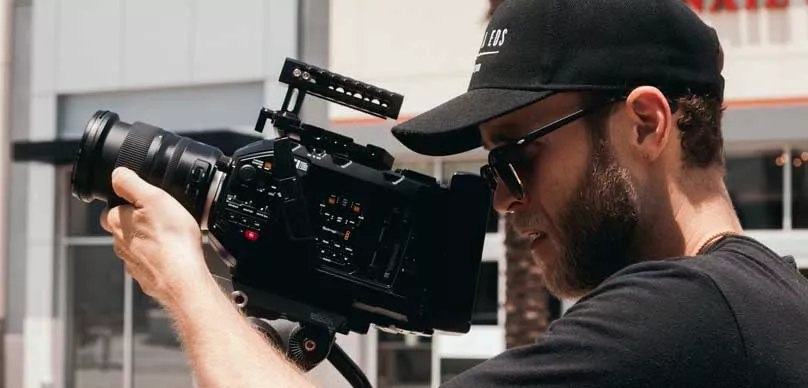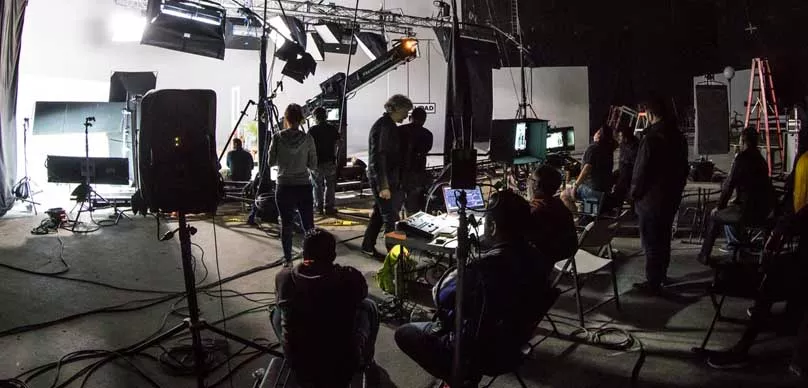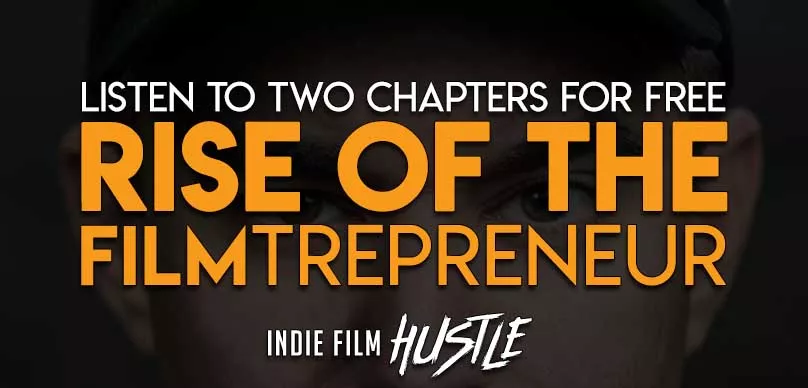Right-click here to download the MP3
We are living in a crazy world, my friends. I wanted to do an episode on the effect the Coronavirus is having, not only on the film industry at large but also on how it will affect the indie filmmaker. With major events canceled like SXSW, MIPTV, CinemaCon and, Cinequest, indie filmmakers are already feeling the effect. Twenty four of the largest theater owners in China have pulled out of CinemaCon, the largest convention of international theatrical exhibitors. Is the Cannes Film Festival and Market next?
Production has stopped on Mission Impossible 7, which was shooting in Italy and the extremely popular The Amazing Race reality show has been suspended. The new James Bond film No Time to Die has been pushed until Nov 2020. Disney’s Mulan, which is a love letter to the Chinese market has canceled it’s China premiere and the release date in the US is up in the air.
The Chinese box office has been at a standstill. 70,000 screens have been closed since January with no word when they will open. This has cost $2 billion in lost revenue to the Chinese and world film industry. The worldwide box office has lost $4 billion to date and growing each day. The theatrical box office was down 26.6% vs 2018 and this could be a MAJOR nail in the coffin of an already vulnerable theatrical business. We are in crazy times, my tribe.
In this episode, I go over how this event is affecting indie filmmakers, what they can do to prepare, adjust and/or pivot in the coming weeks and months. It has never been more important for filmmakers to adopt the Filmtrepreneurial Method. Diversification of revenue streams is the only way filmmakers can hedge their bets in the uncertain times ahead.
Sit back, pull up a stiff drink, and take a listen.
Alex Ferrari 2:53
Welcome guys. I wanted to give everybody an update on what's going on in the world today and how it's affecting not only the film industry, but how it's affecting independent filmmakers. And I'm assuming at this point, and you guys know about the Coronavirus and the effect that it's having on the world, which is pretty massive if as of this recording today, the stock market has now dropped nearly 20% in the last 11 days. And that's pretty scary today alone, it got almost to 2000 points below dropping 2000 points. As of this recording, I think it's at around 17 1800 still. And it's getting, it's getting kind of crazy, it's getting kind of insane out there. So I know that the last thing a lot of filmmakers are thinking about is like, Oh, this How is this gonna? This is not gonna affect the film industry? Well, it is. And I want her to kind of talk to you all about it. And also, now let's talk about how it's gonna affect the film industry, but how it's gonna affect us independent filmmakers, and how we can prepare for it, how we can deal with it, and hopefully thrive in this new world that we're kind of walking into. I've said many times before that our industry is was being held together with, you know, just holding on, we were just kind of putting tapes and patches on the dam before it broke. And that we were still in fairly good economic times. I don't know if this is going to be where this is going to take us as far as the stock market and how it's going to affect the economy and how it's going to affect us as filmmakers. But I hope it pops back up. I hope it stabilizes and I'm sure it will. I think people are still very uneasy, and there's a lot of confusion out there a lot of unknowns. And when people don't have any security of what's going to happen. People get a little crazy as I saw some videos of people fighting at a supermarket for toilet paper. So I don't think this is the end days, by any stretch. It is something serious. It is something definitely affecting the world. not making any light of it. But let's talk about how it's affecting us and our industry. First thing I want to talk about is the major events that are being canceled. And this is something I've never been, you know, I've been in this business 25 years. I have not heard of this happening because of a virus or pandemic or something along those lines, but South by Southwest has been cancelled. cinequest has been postponed. MIPCOM film market has been canceled. Cinema con, which is a big convention for all the theatrical exhibitors around the world is still going it's still scheduled to go on but 24 Chinese film exhibitors have pulled out, which is insane, because they are one of the biggest markets in the world. It's essentially saying, oh, AFM is open and Cannes is open but no American distribution companies or studios are going to be they're scary. Right now the Cannes Film Festival is still scheduled to go that is still up in the air just like South by Southwest was up in the air. I called it last week, I'm like, I don't know it might get canceled. Can might be the exact same thing. As far as film production is concerned, Mission Impossible seven has stopped production in Italy because of the virus. The very popular show The Amazing Race has been suspended completely, which is a massive, massive hit as far as financial to those companies. Also the Olympics are still going on are still planning to go on the Summer Olympics in Tokyo, but who knows. And that's a tremendous amount of production and then tremendous amount of money for the network's for the studios that own the networks, as well as production and things like that. So it's pretty, pretty insane. Film releases. I know at this point, most of you know that the new James Bond no time to die has been pushed back from November and was supposed to come out this month. And Milan might get pushed as well. Milan is a $200 million Disney film. It's the remake of the animated film. And it is basically a love letter to China. So they have canceled the release of it in China, as well as a list of every basically every major release has been canceled in China, which I'll talk to you about a little bit more in a minute. And in May all the major blockbusters are scheduled to go the New Black Widow from Marvel Studios and all these other big movies are supposed to come out and they might be impacted. So this could really, really hit the industry where it hurts. Now, the Chinese market is basically the box office is at a standstill. 70,000 movie theaters in the Chinese market have been closed since January and there is no word until when they will reopen. They have lost $2 billion in revenue so far. And across the world because of this virus $4 billion and worldwide box office has been lost. And major major releases throughout all major releases from the studios have been cancelled in the Chinese and Korean markets, which are both monster markets for us. Talk a little bit more about that in a minute. sag AFTRA also created a statement of made a statement publicly to not only to the studios but to everybody that they are monitoring the situation and their main concern is to protect the health and well being of their members, which are the actors. Well, if for whatever reason, in the coming weeks, things started to get a little insane more than today. sag actors might have to be pulled back and not allowed to work until this thing blows over. I can't I can't even imagine what kind of impact that would have on the studios on television on the streaming services. Now the theatrical box office has been taking a hit lately, from 2018 to 2019. theatrical box office lost 26.6% of its revenue. And that's with the monster movies that Marvel and Disney have been putting out because by By the way, Disney owns the top seven of the top 10 biggest box offices of last year. So if Disney was not around, and Marvel was not doing what it's doing, the entire film industry would be in a much, much worse place than it is now. This, this virus might be a major nail in the coffin of a very, already very vulnerable, theatrical business. You know, I don't think theatrical releases will ever go away, I think it's still going to be a major box office is a major revenue stream for studios. Around the world, people still want to go out but right now, this is people don't want to go out into public places where there's, you know, a lot of people you know, it's it's hurting, it's hurting the box office numbers a lot. And people are already starting to trend away from theatrical releases in the way it used to be. So just like the DVD market, and the blu ray market, and the foreign sales markets, all those market started to trend differently, while the theatrical business is starting to trend differently as well. And the studio system is trying to deal with it as best we can. And I'm gonna keep talking about the big the macro, the macro view of this whole thing. First, before I get into how it's going to affect us, and where the potentials are for us as independent filmmakers. Streaming is up and will continue to grow with Disney plus Netflix, Hulu. And now coming on to the on the playing field, HBO, Max and peacock are both going to be coming on in the coming months. And numbers will continue to go up. So people are staying home, people want to stay home because they're afraid because of this virus. You know, I don't know how long the virus will be I think during the summer, it will, it will more than likely calm down. Historically, that's what happens with with these kind of infections. But in the in the winter, it could go back up again. That is another thing after I started studying a little bit about pandemics in the past, that is kind of the way it goes. Mind you in the past, we didn't have the technology we had, we didn't have the advancements in medical, in the medical field that we have now. So it's not as big of a deal as it was in 1918. With the Spanish flu, let's say we're now there's so much more available worldwide to help with this. And it has been. So I don't know how long this will last. But I know it is going to have a major effect on the studio system, it's going to have a major effect on the entertainment business. in general. It's also affecting the gaming industry, it's affecting so many different industries, I can't even start to list. This is something that nobody saw coming. This is not something that the studio system has prepared for. It's not definitely not something that the rest of the world was prepared for. But let's talk about the studio system. And the entertainment business in general. They, they never they never saw this coming. And I don't think many of them have a plan to deal with it, obviously. So studios that have not diversified their revenue streams are extremely vulnerable. This is what I've been saying for a while now. That the major studio systems, there's only a handful of them that will survive if we get hit with a really big economic hit. And not only is that happening right now, the economy is still you know, getting a little bit shaken up. But just the revenue than the cash flow going to our to the studio systems is getting hurt right now because of lack of box office. You know, what if the so if Sony's film division, all of a sudden, was deprived of most of its box office this year, what do you think will happen to Sony? What do you think happens? If bond doesn't do well, because people aren't able to go see it in the theater? Do you think they're gonna change stuff? Do you think that this might be the thing that drives the studio system to start moving away from box office and moving more towards, you know, a day in day release? I don't know. Now, the question is, how is this going to affect independent filmmaking? Well, I promise you something. And I've said this before, and I'll say it again. I promise that predatory film distributors will become even more predatory. As their cash flow starts to tighten around their necks, if you will, is that cash flow starts to tighten down, they're going to start getting more and more desperate and, you know, it's going to get harder and harder for filmmakers to get any money out of them. If ever fewer depending on what type of deal you signed, it's never been more important for you to have the to use the film to pretorio model to diversify your revenue streams for your film and or films and or production companies. If streaming or theatrical revenues dry up for you as independent filmmakers, which to be honest with you, it's kind of already has, I think we're in good shape in that sense, because not a lot of people are making a tremendous amount of money on streaming, or theatrical. There are some, but generally speaking, that's not been a cash cow. For us as independent filmmakers. There are exceptions and there's a lot of people who are making money, don't get me wrong. But generally speaking, it's not been a it's not the glory days of the 90s or even the early 2000s. So if all of that revenue dries up, and that's the only way you're generating revenue for your film and or films, you're screwed, you're done. But you're not gonna be able to make make money with your films anymore. But if you had other ancillary product lines, if you had other services that you are selling that are outside of this business, meaning online education, merch, mirch services, other you know, other other events, situations, maybe not the events so much anymore. But other revenue streams as I laid out in my book Rise of the film entrepreneur, then you're going to be in a lot better shape, as money will continue to roll in. And you can kind of hunker down while this storm passes. Now the bottom the other thing is, though, this might be a tremendous, tremendous opportunity for independent filmmakers, because now people are streaming more people will want to go to stay home, they want to see more content. And if production slows down, new production slows down. And all the production for these new platforms starts to slow down or stops because of sag or because of worries like they did in Italy, because of Mission Impossible, they just shut down production shut down Mission Impossible seven. I mean, millions and millions of dollars are being lost every day that that movie is not on, and won't be anytime soon. If production starts to slow down, or halt, these streaming services are going to need more content, existing content. And that's where we might fall back in in favor, people will be like, oh, all of a sudden Netflix is like I need new stuff. Let's go out and look what films are available. Let's see what shows are available. Let's see what's out there. And let's start buying stuff up because we need content. And if you're in a good place and have that content for them, and if it's what they need, it might be an opportunity. So keep an eye out for that opportunity. Present yourself in a way that those opportunities might be good for you. And might be attractive for streaming services and new streaming services and new Avon services to to look at if you are working out if you are working with a distributor, and you have a distribution partner, reach out to them and find out Hey, what do you guys do and how is this affecting you? You know, are you going to go to can Are you know what? What do you see happening in the next year? How are they? How are you? How are you planning to deal with this? See what they say? You know, hopefully if the distributor is proactive, they're going to release some sort of statement or email to all of their partners and say Hey guys, this is what's going on. We're gonna keep you updated on everything you know, hopefully distributors would do that. I'm not holding my breath and all of them I know handful will but start to have that communication guys, especially if you're expecting payment expect especially if you're expecting some sort of sales to come in. You really need to start communicating and start figuring things out with your distribution partners. And see how this is affecting people because if it's affecting the giant if is expecting the giant studio system, this gargantuan Goliath it will be affecting your mission. level or low level distribution companies. I promise you, it's gonna hit everybody. You know, the box office is still a major revenue stream for a lot of a lot of studios and theatrical. So when that money starts to dry up, you know, the feds gonna hit the Shan guys. And let's not even start to discuss the foreign sales and international sales. That's going to be really difficult and interesting to see how that pans out over the quarter and the next quarter next 3456 months, especially if the Cannes Film market is canceled. It's gonna be really interesting. You know, I hope by the time AFM rolls around in November, we'll be able to have that I really do hope so. And in all likelihood, it will. You know, I don't want to be you know, a tinfoil conspiracy theorist, you know, tinfoil hat conspiracy theorists like the world come to the end, Walking Dead's coming, I don't believe that I want to as part of being part of my tribe to understand what's going on. And to adjust, pivot, and prepare, if you're in production, to understand where your what what kind of marketplace you're walking into, if you're done with a movie, and you're trying to get it out into the marketplace to understand what kind of marketplace you're working into. If you've been in the marketplace, for a while, understand what kind of marketplace you're you're in, and maybe new opportunities for your film that I've been sitting on the shelf for 234 years, there might be new fresh opportunities for your film, or series, or to dust off some old stuff and see if it hasn't hasn't some new value to it. The world is changing guys. I've been saying this so often over the course of the last year that this was possibly going to happen not this way. But this Something is happening. And again, I hope it bounces back. I hope the stock market tomorrow bounces back another 2000 points, and we start to stabilize and more likely that will happen in the course of the next three or four months, I think we will start to stabilize? I don't know, I really don't know, nobody knows. But I hope that once the virus starts getting weaker, people get a little bit more, you know, wrap their heads around it or under control contained, if you will, once people feel that, then things will start to level off again. But the problem guys, one of the major problems I think the film industry has specifically with the China market is that the Chinese box office market or the film market in China in general has been propping up the the numbers for the entire studio system. You know that this is a new phenomenon. China was not a box office power 15 years ago. This is a recent phenomenon that they were able to build out such a massive infrastructure where they turned into the number one, I think they're number one, or still close to number two, I'm not sure I think they might be number one at this point, as far as how much money they generate in their box office. So the studio system obviously has been able to profit from that all these huge monster international numbers. A lot of times China has major chunks where films are making 234 100 million dollars in their markets. So that is propping up that's that's generating a lot of cash for the studio system. And in turn for us as independent filmmakers until the embargo happened a few years ago. independent films China is buying independent film like crazy, you know, my film was sold. This is mega sold to China, for God's sakes back in 2015. So it was a market and now if you rely too much on one revenue stream, like the studio system might have I mean substantial percentage of their of their box office of their money will hurt when it gets pulled off. This is what's happening throughout the world right now. All of a sudden, everybody woke up one morning and said, Oh crap, we make everything in China. And if China shuts down, which they did, and all their factories shut down, which they did, all our supply chains are shopping, iPhones, every everything gets shut down. So then all by God, we were dependent on this car on this country. It's any country by the way you are any kind of revenue stream if you're dependent on one thing, if that one thing goes you're done, you've got to diversify. You've got to diversify your revenue streams. This is business 101. So I feel that the studio system has has been very vulnerable over the last few years. You know, there have been a couple of companies, Disney specifically who have thrived in this market because of what diversification in their revenue streams. And I've talked in length about that in other episodes. But I want you to understand that that is the model for the future. And if the studio system, the studios, the other studios do not follow suit quickly enough, they will fail. And they will be bought up for their libraries, by Apple, Facebook, Google, or another gun gadget when Goliath out there who wants to get into this space? Someone was cash flush. Okay. So independent filmmakers have a potential to be able to thrive in this business and thrive in this new marketplace. But if you do not diversify your revenue streams, and you live by the old model, you will not make it I'm promising you that. Ask ask around, ask around, go go to our go to our protect yourself from film predatory film distributors and aggregators Facebook page, and sign up a Facebook group and sign up, you can ask see how it is as the front line of what's going on right now. In the business, you got filmmakers right on the front line seeing if they're selling their movies or not selling the movies, they're making money, they're not making money, it is a just a treasure trove of information about what's going on right now up to date, to the minute. I've said it before, and I'll say it again, the filmstrip neural model, being a film intrapreneur an entrepreneurial filmmaker, diversifying your revenue streams for your film, regardless of size, is the only way you will be able to survive in the coming years. This is the first blip of what I've been talking about. I hope it stabilizes. But this is the trend, guys. I want you to really hear me on this. This is where things are going. So you really need to prepare yourselves and not dilute yourselves. Or not to fool yourselves. In delusions of grandeur or delusions of well, this is not that doesn't count for me, it does. So prepare yourselves for where you're where your industry is going, and how you can take advantage for your film at a certain window of opportunity. Just like Scorsese Spielberg Coppola did in the 70s. Just like Rodriguez Tarantino, Kevin Smith did in the 90s. And now we have our window, what that window is how long that window will last. Who knows. But the windows of opportunity that happen in in life in general. And there is a window opening here. Because when there is such upheaval, when there is a crash, if there is a major shift in the way business is done in any industry, there's potential for other filmmakers and other projects and other producers to have an opportunity that might not have been there before. Just look at history. So I hope this I hope this episode and this video helped you guys out a little bit to understand where we are right now, where we're going, I felt it was really important for me to come out and talk to you as a tribe. Because I have been getting a lot of messages about this have been talking to a lot of filmmakers about this. And I just felt it was important for you guys to get this information. So I will keep you up to date on as much as anything else I hear. If it's major, I will do another one of these. But if you want the latest updates on what's going on, go to that Facebook group. Just go to indiefilmhustle.com/protect yourself. And they'll take you straight to the Facebook group page, sign up there, answer some questions, and then see if we approve you or not, depending on if you're a distributor or not, you're probably not going to get in. But just answer those questions. And we look at everybody who puts tries to sign up. either me or our moderator, one of our moderators will check to make sure everyone is good. We're very protective of this group. And there's a lot of great information there and people are there to help. If you want the latest on what's going on. Go to that Facebook group indiefilmhustle.com/protectyourself. We'll take you right there. Stay safe, everybody, wash your hands. Don't get crazy. Toilet paper will be there. You know, this is not the end of the world by any stretch of the imagination. But I want you to be aware of what's going on, and how it's affecting our industry and how it can affect you. Now, if you want to link to that Facebook group and some other episodes in regards to where we're at in the film industry in the new film world economy that we're walking into, head over to the show notes at indiefilmhustle.com/378. Now, everyone, please be safe out there. Wash your hands for God's sakes, and just do common sense things to keep yourselves and your families safe. Thanks for listening. And as always, keep that also going. Keep that dream alive. And I'll talk to you soon.
Sign up to receive email updates
Enter your name and email address below and I'll send you periodic updates about the podcast.
LINKS
- Facebook Group: Protect Yourself from Predatory Film Distributors/Aggregators
- The Death of Traditional Film Distribution
- The Dark Underbelly of Predatory Film Distributors – BEWARE!
- Rise of the Filmtrepreneur®: How to Turn Your Indie Film into a Moneymaking Business
- Rise of the Filmtrepreneur®: FREE AUDIOBOOK
SPONSORS
- Bulletproof Script Coverage – Get Your Screenplay Read by Hollywood Professionals
- Audible – Get a Free Filmmaking or Screenwriting Audiobook
- Rev.com – $1.25 Closed Captions for Indie Filmmakers – Rev ($10 Off Your First Order)



















